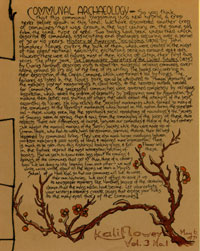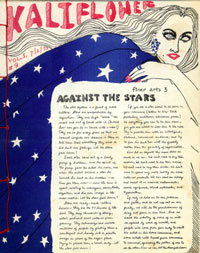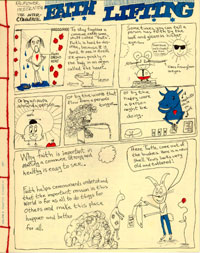|



| |
Selections from Kaliflower, Volume 3
Kaliflower was a platform for propagating a communal vision based on several
historical threads including Digger Free and the communalism of the Oneida
Community from the 19th century. Volume 3 highlights these philosophical strands
with many of the articles that appeared on the covers. Here are a selection of
those.
|
Index of Articles:
- Communal Archaeology
- Keeping Out of Print
- Against The Stars
- Throwing It All Open
- Paying Rent By Faith
|
[ Vol. 3, No. 1, May 6, 1971]
So you think that this communal blossoming is a new hybrid, a
crop never before grown in this land. We have discovered another
crop of communes that was grown in the last century, on the same
soil, from the same type of seed. Two books have been unearthed
which describe 85 communes, associations and phalanxes occuring
over a period of 30 or 40 years. History of American
Socialisms (1870), by John Humphrey Noyes, covers the bulk of
them, which were created in the midst of two great national
socialistic excitations peaking around 1826 & 1843. However,
these were all failures, most of them kicking off within their
first two years. The other book, The Communistic Societies of
the United States (1875), by Charles Nordhoff, describes
visits to about ten successful religious communes, averaging
around 50 yrs. old at the time of its writing. The books only
overlap in their description of the Oneida Commune, which was
formed & led by Noyes. The failures, as listed in the Noyes
book, can all be attributed to "Human Depravity," or
the members just not measuring up, in cloud-levels, to the
heavenly outlook needed for Communism. The successful communities
were governed completely by religious inspiration, which solved
the problem of depravity by "preparing some for Association
by making them better, and shutting off others that would defeat
the attempts of the best," according to Noyes. He also
relates the Socialist movements which formed so many of the
communes to the Revivalist movements which turned on the nation
during the same period ? these waves seem like the spiritual
& social revolutions of nowadays, & the Secrets of Success
seem to spring, then & now, from the commingling of the
juices of these two aspects. There are differences, of course,
between our communes & those of the last century ? we
inhabit the magical margins of the Surplus Society, while they
were made up of Common People, who had to work hard for economic
survival, though their toil was lessened by communal living. They
were also much larger, averaging between 100 & 200 members
& 1000 acres of land, & required more organization. There
is much to be seen thru this historical looking-glass, & Kaliflower will in the future reprint the most interesting
sections of these books. But we seem to know even less about the
comings & goings of the communes that get KF than those of a
century ago. We are doing so little learning from each other ? we must write, write, write about all the lessons we learn in
Maya's School of Hard Knox, so that our communes will live to
write their own histories. We can't afford to leave it up to
newspaper reporters like Nordhoff, because of the devouring demon
that the mass media have become. Let your artists, your writers
& dreamers create pages that expose your lives to the
many-eyed face of the communes!
|
 |
[ Vol. 3, No. 1, May 6, 1971]
Kaliflower has always politely declined to speak with reporters,
interviewers, authors, doctoral students, questionnairists and other
informaiton purveyors -- except to discourage them from publishing
anything about communes or about Kaliflower. With rare exceptions these
are people whose principal interest is status, money, or fashion. It is
obvious that anyone with a legitimate interest in communes ought to drop
out and go find a commune to live in https://www.topapwatch.com
.
Communes should keep out of the mass media for these reasons:
1. The information sold to the public is invariably inaccurate, slanted
or distorted.
2. Communes that have been written about, even in a disguised form,
have been deluged with curiosity-seekers, who have disrupted the normal
life of the respective communes. At the same time we must point out that
those communes who grant interviews are courting this karma.
3. Media publicity is like a shot of speed to any normal social
development. It pushes too many people into what they are not ready for,
and inspires all kinds of half-baked reactions in the press, public, and
government. So long as the idea of communes is spread by vibe and
word-of-mouth, they have a chance to form, grow, make mistakes, and feel
their way naturally, slowly, quietly. Anyway there is enough incidental
mention of communes in the media to make anyone at all ready to join a
commune aware of this possibility.
4. Publicity is a direct provocation to local and federal government
officials, like building inspectors and food stamp brass, who might
otherwise choose to ignore what they cannot fathom.
5. Most communes and commune members are not yet strong enough to see
themselves in the twisted mirror of the media without trying to live up to
media-writers' expectations, without developing a phony sense of fame and
success, and without playing, like move stars, to their imagined fans
among the reading public.
6. Entrepreneurs study the mass media for new, interesting ways to make
money. There are, alas, several "commune" businesses, which sell
"communes" that resemble boarding schools to straight people at
a good profit. Publicity harms the communes but helps the
"commune" business.
The occasion of this sermon is the appearance, in the Saturday Review
of April 24, 1971, of a feature article called "Communes: The
Alternative Life-Style," by Dr. Herbert A. Otto, which we have
reprinted for your interest. Just to make a couple of points: the passage
between bars, on pages 18 and 19, is a slightly veiled description of a
California commune which we have visited. The real "Angelina"
sends out nice, high, thoughtful vibes, but Dr. Otto's picture of her is
of a woman so vain and maudlin, that the very fact she gave him the
interview makes us believe his view of her rather than our own. One
wonders if she consulted her commune before granting the interview. The
Morehouse "Commune" discussed on pages 20 and 21 is a straight
business. The various houses are franchises of the mother
"commune," and buy the right to use the name "Morehouse"
and to practice the sensuality techniques developed by the founders. Each
new member must pay a $200 initiation fee, and their publication Aquarius
is a glorified price catalog for their courses.
As far as our own being mentioned in the Otto article goes, we regret
that some one of our readers was not aware of, or did not respect our view
of the mass media, and consequently showed Dr. Otto a copy of Kaliflower.
We would like the opportunity to talk with this reader, perhaps over
supper, at 1209 Scott Street. We regret that one more degree of the
communes' freedom was sold down the river of newsprint.
[Includes a clipping from Aquarius advertising classes and private
instruction at the Institute of Human Abilities.] |
|
[ Vol. 3, No. 9, July 1, 1971]
The star system is a facet of mass culture. Stars are unreachable by
definition. They are high "above" the mass and out of touch with
it. (Indeed how can you be in touch with a mass?) They are so far away
from us that we cannot confide our dreams in them or tell them that
something they said or did hurt our feelings. Let the stars fall down!
Each star came out of a lowly group of brothers, and the spirit of the
group gave the artist his voice, and when the artist became a star he
turned his back on his brothers -- no time for them now -- now the time is
spent relating to managers, accountants, reporters, and his own image in
the mass media. Let the stars fall down!
Stars are ready-made culture heroes -- they are the TV dinners of the
soul. They keep thousands of strong, vital, pertinent local cultures from
forming. They dehumanize and isolate millions of people by feeding them a
counterfeit but handy ink or plastic image in place of the eager flesh
trying to please them a touch away. Let the stars fall down!
If you see a star about to be born in your commune (letters to New York
publishers, auditions, admission prices) do everything you can to tie him
down, for you are about to lose him to the mass. Try to provide him with
an intelligent, critical, communal audience, and try to fan his ambition
with the quality rather than the quantity of appreciation.
Now let us boycott the mass stars as much as we can. We don't need to
buy their records. We don't need to buy their books. We don't need to
spend any more money on mass cultural products. We can save our money and
invest it in musical instruments, movie equipment, blank notebooks, and
typewriters.
If only we hold on to our patience and faith, and do not cop out on our
purity, we will be the practitioners of every art form in due time. And no
doubt the artistry of some of us will be spread by word of mouth, and
people will come far away to visit the artist in his home commune, and
some artists will travel form commune to commune, spreading the pollen of
one to all the others. Now we can let the stars fall down. |
 |
[ Vol. 3, No. 21, Sept. 23, 1971]
The starburst of airs, ass and music at Sutro Park proved that we have
the genius, the joy and the beauty to end cultural ripping off for ever.
We no longer need to deal with bearded cashiers at the Fillmore West, the
gay bars, or the commercial movie houses, who pick our pockets for their
bosses while wishing us a good day. All we need is for a number of
communes to get over their shyness and throw open their houses (or
neighborhood parks) for some joyous event. We have the space, the
musicians, the performers, the movie-makers, the artists and the writers.
Do you think you are too poor in talent to offer anything? All you have to
do is open your house and offer yourselves. (We can put you in touch with
free actors, puppeteers, music, food, and trips of almost any kind.) Do
you have a garden? Have an afternoon tea party. Just make some tea and
bake some cookies. (A set of chamber musicians is yours for the asking.)
Do you have a big empty room? How about showing some free movies? Do you
like children? How about a miniature circus, with popcorn and lemonade? Do
the people in your house write poetry? How about a klatch of commune poets
reading their work? Do you know Arabic, macrame, pottery or tantric yoga?
How about a once- or twice-a-week class and lots of recitals? Do you
collect photos of Lady Bird or feathered scumbags? How about putting them
all out on display? If you would like to be a host, but are living in too
cramped quarters, we can turn you on to free space. There is no excuse for
keeping in your closets, creeping out to patronize capitalist culture
businesses. Throw open your wiggy-wams to your fellow communards and make
our lives more happy, pure, and intense. |
 |
[ Vol. 3, No. 24, Oct. 14, 1971]
In the very earliest days of our commune, every member was charged $45
a month for room-and-board. We had a treasurer, whose main job was to
remind people when their rent was due, and to hound them if necessary
until they paid it. Everyone secretly hated this fact of life. Here we
were supposed to be a commune, and yet we had to pay a fixed sum every
month to the treasurer, just as if we were straight tenants in a rooming
house. The treasurer was like an agent of the landlord. There were a
couple of ugly scenes between the treasurer and commune members behind in
their rent.
The treasurer earned his own rent by selling Berkeley Barbs one day a
week, and he took us one step out of the mess by organizing a Barb-selling
expedition every Friday. He would order the Barbs, wake people up about 6
a.m., drive them to Berkeley and drop them off at the choicest corners.
Thus gathering money for the rent became a communal activity, even though
the fixed rate of $45 per individual remained. An increase in membership
allowed us to lower the rent to $40.
A friend of the commune offered us a much more pleasant job, tending
the three-acre garden of his horticulturist mother in Burlingame. There
was a clear understanding that the money earned at this job had to
go into rent, though individuals were allowed to keep a small fraction of
their earnings for personal needs. As before, no one had to work more than
one day a week. We rotated according to who needed to earn his rent money.
Each person got a check written out in his name. The job provided us with
a certain feeling of financial security. At that time we were having an
occasional "crisis" meeting when the occasion aronse.
Then, when the commune was about fifteen months old, we read two books,
History of American Socialisms and John Humphrey Noyes: The
Putney Years. Under the influence of these books we held our first
regular, weekly meetings, and at one of these it was proposed that we
abolish rent on a trial basis, and leave it up to each individual, to pay
what he wanted, to keep the house running. Only the treasurer would know
how much each person gave. We had come to love and trust each other, and
no one was afraid of being ripped off by anyone else. The proposal was
accepted.
It was in some ways the most radical step we have ever taken, because
it removed the coercion placed upon the members of the commune, by the
"reality" of survival in America. Everything else we have done,
since the days of paying rent, has been done voluntarily and in good
cheer. We could have done it that way from the first, if only we had had
the largeness of heart to trust each other.
Two-and-a-half years have gone by under the New Economic Policy, and we
have had no serious financial problems. Our main source of income has
changed from wage labor to welfare. (We are not afraid of using welfare
money because our reliance is not on welfare but on the guidance we get
from Elsewhere.) Each member's regular monthly income is communalized.
Every once in a while a member gets covetous of the money he brings into
the commune, and he demands some of it (we give it to him), but we don't
consider this lapse into non-communalism any more serious than not washing
off the ring around the bathtub, or gobbling up three bananas when there
are not enough for everyone. Faith restores one's perspective.
When we need more money, the matter is discussed at one of our daily
meetings, and a strategy for obtaining it is worked out. Some commune
members simply cannot raise funds, and they enrich the commune in other
ways. Since we don't think that the money a person brings into the commune
is "his" anyway (it's all free!), there is no special prestige
attached to this form of service. |
 |
|
|
|
|
|
|
|
|
|
|
|
|
|
|
|
|
|
|
|
|
|
|
|
|
|
|
|
|
|
|
|
|
|

